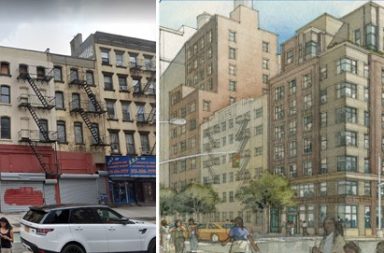A FORMER Queens industrial complex is being turned into the city’s first lifestyle center.
The Shops at Atlas Park is located at Cooper Avenue and 80th Street in central Queens along the borders of Forest Hills and Glendale and close to Rego Park, Kew Gardens and Middle Village.
While a heterogeneous neighborhood, there are enormous numbers of people with disposable incomes.
“The exercise was what to do with a 400,000 square-foot industrial property on 12 acres in a place where industry is dying,” explained Damon Hemmerdinger, development director of the family project.
“We found there is a big unsatisfied demand for this kind of shopping experience. And the tenants are agreeing with us.”
A classic lifestyle center is newly created as if it were a Disney-like small town.
Typically, it is master planned with pretty, three to four-story adjoining townhouses that are grouped around a central town square and fountain.
The townhomes (actually taller than what one would expect) have residences on the top two to three floors, plus lively restaurants and shops on the lower two floors facing the central area.
All the residential entrances and auto parking are on the exterior of the public areas.
Atlas Park is redeveloping two-story buildings grouped around a 2.3 acre park and fountain, and creating parking for 1,200 cars on an exterior adjacent building so shoppers can easily access the second story shops.
Lifestyle centers typically do not have a formal anchor tenant. But there is usually a multiplex cinema, sometimes a live theater, or perhaps a downsized version of a department store, along with numerous, small, nationally known shops.
A certain group of retail tenants is attracted to these projects and usually ends up leasing together.
“Lease to one and the others follow,” Hemmerdinger said.
Retail experts said the key to a success Lifestyle Center is a group of womens apparel tenants that include Coldwater Creek, The White House and Black Market, Chico’s, Ann Taylor Loft, certain fashion accessories, shoe tenant Aerosoles, and other shoe retailers.
Also desirable are furniture and accessories purveyors like Sur La Table and The Bombay Company.
In other markets they want to be located in the open air and not in enclosed regional malls, so there is sensitivity to the design and pedestrian flows of the lifestyle center.
Two examples of successful traditional lifestyle centers are CityPlace in West Palm Beach, Florida and The Grove in Los Angeles.
Ironically, CityPlace, like some of the other lifestyle centers around the country, was an urban renewal project.
It turned a former slum into luxury housing and upscale shopping, with plenty of shady places to sit and people-watch, and simply enjoy a reinvented urban experience.
Franklin Zuckerbrot of Shalom & Zuckerbrot, who is not involved in the Atlas project but represents tenants giving the project more than a once over, says shoppers enjoy the lifestyle centers because they like to know where they are going and can get in and out quickly.
“There is a strong feeling on the part of the consumer that there is a preference about not going to a regional mall,” Zuckerbrot said.
The Shops at Atlas Park is facing a slight uphill battle, however.
Some local retail experts believe this is because developer Atco Properties & Management is not starting from scratch.
Atlas Park is not located next to a subway transportation hub, and is competing with nearby traditional street shops and department stores.
But fourth generation developer Hemmerdinger says bah humbug to them all.
“One big distinguishing feature in this project is its emphasis on providing people an experience along with the tenant mix,” Hemmerdinger said.
“It’s a relatively ordinary tenant mix in other parts of the country, but because these tenants only want to be in certain kinds of projects, they will be new to New York.”
Hemmerdinger is wooing the tenant group and has a movie complex under lease. He also has plans for future office and entertainment development.
“There will be a large component of food – a collection of table service restaurants, some white [upscale restaurants], some table service and some casual service,” Hemmerdinger explained.
“There may turn out to be other entertainment uses. We’ve talked to comedy clubs but so far, nothing else is lined up.” Rents will depend on size, shape, floor, and of course, how quickly the retailers sign leases – with pioneer tenants getting a break. The first phase is now scheduled to open in March, 2006.
As is typical for such environments, retailers will also pay percentage rents based on gross sales, so the developers will share in success.
“The cost of occupancy is much less than other choices a tenant might make in Queens,” Hemmerdinger insisted.
Atlas Park is not the only lifestyle center on local drawing boards and an astounding 35 million square feet of such development is slated to open in 2006 around the county.
Forest City Ratner is creating a 1.2 million square-foot center along the New York State Thruway in Yonkers, right by category-killer foodie, Stew Leonard’s.
Ridge Hill Village Center includes a hotel, some office and a “leisurely setting in which to stroll, eat, shop play or live,” the website brags.
Another, Heartland Town Center, is being planned for 452 acres in Islip that Robert K. Futterman of Robert K. Futteman & Associates is leasing.
The 1.5 million square foot project is being developed on Long Island off Exit 52 of the Long Island Expressway. Both will include master planned apartments – and thus create instant pedestrian traffic.









